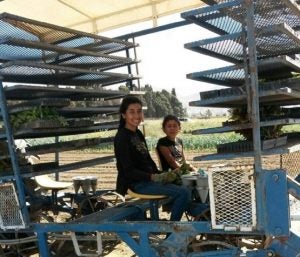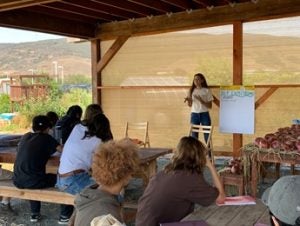Gissel Neri Corcoles’ mother has been a farmworker in California since she was 15. Through ALBA, a nonprofit organization that helps low-income field laborers advance their careers through land-based training in organic farm management, she was able to get one acre of farmland — the same farm Gissel remembers growing upon.
“I have memories of being out there at the age of 3 and 4,” she said. “There’s a home video of me planting seeds when I was 2 with my parents and my family, and they really cheered me on.”

Over the years, her family farm grew to 15 acres in the Salinas Valley. By then, Gissel was a teenager and had very different feelings about agriculture. Like any teenager, she wanted to go to the mall and hang out with her friends. However, she spent much of that time working alongside her family on the farm. Early mornings and late evenings after school were spent helping her parents manage their farm to fulfill produce orders. There were no extra farmhands — just her and her three sisters.
In high school, Gissel joined her local FFA chapter. She began to see how her experience growing up on a farm translated into something more meaningful. Time on their farm equated to family time. She considered the idea of becoming an agriculture teacher. And despite what was backbreaking work, it meant a lot to her.
“I knew what it was like having a backache about life after working in the field for long hours,” Gissel said. “I knew what it felt like to work when it was really cold and when it was really hot. And when the days were long … I just wanted to go home and rest. I had all of that. But at the end of it, I’m working on a farm again.”

Gissel had served the National Society of MANRRS as the 2020-21 National Undergraduate Student President and recently graduated with her degree in Agricultural Sciences from California Polytechnic State University in San Luis Obispo. She works as Education Program Coordinator at Youth Empowerment Program for Agriculture. Her career in agriculture has been a journey.
“I remember my freshman year in college, my mom would still be telling me that I could switch majors,” Gissel said.
And this experience is not uncommon for people like Gissel. As the daughter of immigrants, much of what her community associated with agriculture is not total bliss. “Uprooting from their country to the U.S., they related agriculture to struggle.”
Growing up, much of Gissel’s community consisted of Latin American immigrants who worked tirelessly to uphold American agriculture despite fear of deportation. At the same time, the public face of agriculture was largely White male farm owners in their mid-50s.
One of the beautiful things about Gissel’s journey is that agriculture has meant something so much greater than feeding the world. It has become a way to change the face of agriculture.
“There’s a shift in this younger generation starting to reclaim agriculture as a form of resistance,” she said. “I think there’s there’s a way to rebuild or restore all of that historical trauma and pain and suffering that comes from history.”
That’s exactly what Gissel is doing now.
Through her work with the Youth Empowerment Program for Agriculture, Gissel works with students every day and gets to witness their excitement to learn more about agriculture. She loves watching their eyes light up when they plant broccoli seedlings in hopes that they will turn into a full vegetable.
Gissel says that her job is to encourage and teach students about where their food comes from, how to make connections with agriculture in their lives, and to appreciate not only farmers but also farmworkers — and our food system in general. She even was promoted to become a farm manager.
Gissel has applied so many skills that she learned on her family farm. While she is growing in her management and communication skills, she is tremendously supported by her family.

Gissel’s story teaches us that agriculture can mean so many things to the people around us. At its core, it’s about appreciating the hard work of those who had gone before us and sacrificed so much. Whether that be our parents who risked everything to immigrate to this country or our forefathers who toiled the grounds that built America against their will, Black, Indigenous, and People of Color have contributed so much to upholding American agriculture.
“Agriculture is a way to bring people together by using agriculture to empower communities that have inequitable access to resources,” Gissel said. “As agriculturalists, it’s our role to step up to the plate to do our best to inform others, not only about agriculture but also about other world issues. It doesn’t just only affects the work that we do. It affects all of our community.”
Irene Lewis is a recent Master’s student in the John Glenn College of Public Affairs at The Ohio State University with a major in public administration with a focus on public policy and management. She is a south Louisiana native and food justice and access advocate.



